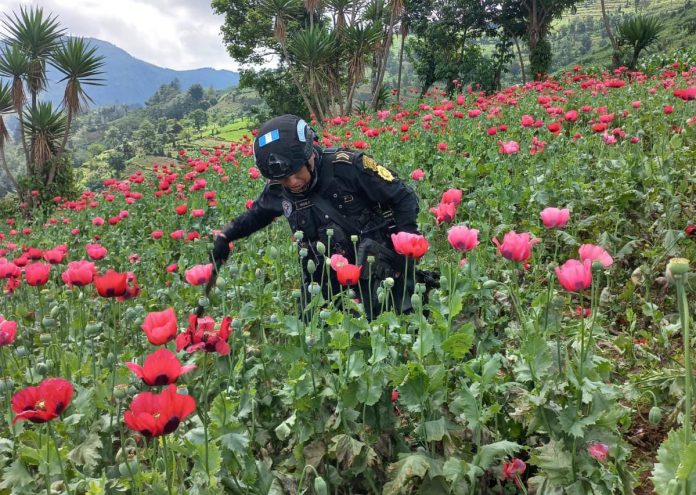Many Americans are worried that over 150 of their fellow residents overdose on fentanyl every day, however do they ever stop to think of how this shift to fentanyl adversely impacts the lives of opium and drug growers in Latin America? This appears to be the concern being asked by human rights groups, and as constantly, the blame and the expense are placed on the United States.
Fentanyl makes much better service sense for the Mexican cartels compared to opium. It can be quickly produced utilizing chemicals sourced from China. Extremely powerful and compact, fentanyl is simple to carry and disperse. Unlike opium, its production is not impacted by climate condition, making it a more trustworthy choice. Furthermore, fentanyl laboratories can prevent detection and obliteration efforts, unlike poppy farms, which are quickly identified by authorities utilizing drones.
The reduction in need for opium has actually led to an extreme drop in costs. Opium, which formerly brought $64 an ounce, is now trading for $ 9.60 an ounce According to a Guatemalan poppy grower spoken with by the New York Times, “Poppies utilized to assist a great deal of individuals make ends fulfill.” The report more states, “Now. the high decrease in poppy costs caused a lot financial discomfort that ‘before the cash goes out, individuals leave for the United States‘”
Apparently, the rate of coca leaves utilized to manufacture drug is likewise decreasing, impacting 200,000 Colombian families that depend upon the drug to earn a living. Rights groups are concentrated on these individuals, missing out on the bigger point that Latin American federal governments must be looking after their individuals which they need to never ever have actually reached a point where a big portion of the population depends on the drug trade.
According to the Congressional Research Service, “ criminality associated to drug trafficking has actually changed political and local disputes as the main source of person insecurity in the Americas.” Now, a drop in drug rates is contributing to the challenge.
Across Latin America, federal governments stop working to resolve their own financial and social issues or suppress criminal offense, frequently blaming the United States rather. Some supporter for the legalization of controlled substances, wrongly thinking it will resolve all their problems. They argue that drug legalization in the United States will decrease costs, weakening cartels and lowering violence in Latin America.
However, proof from cannabis legalization and controlled substance decriminalization in parts of the United States programs increased substance abuse and overdoses Due to the fact that legal drugs are taxed, evaluated, and accredited, prohibited drugs stay less expensive, and the criminal gang-controlled unlawful drug market continues the same.
Meanwhile, from Mexico to Colombia, corruption amongst police, courts, and political leaders is helping with the drug trade. Legislating drugs in the United States or Latin America will not deal with these nations’ concerns.
Even with the decrease in drug costs, opium continues to be cultivated in the poorest, mountainous area of Guatemala, where fully grown plants are processed into gum. This gum is then carried throughout the border to Mexico, where cartels fine-tune it into heroin for circulation in the United States. And the United States continues financing drug removal programs due to the fact that city governments are either not able or reluctant to manage the cartels.
Since the 1970 s, the United States has actually assigned billions of dollars to Latin American federal governments to fight drug production and smuggling. American taxpayers money the arrangement of weapons, training, devices, and lorries to regional security forces. In Guatemala alone, the United States is giving $10 to $20 million each year in help to the military and police. With this financing, Guatemala was successful in eliminating 7 acres of opium farms in 2023, below over 2,000 acres in 2017.
The United States was likewise funding aerial spraying of herbicides in drug-growing areas. Human rights groups sent out a letter to President Biden, advising him to stop moneying these programs. They argued that such actions communicate “ a message of cruelt y and callousness with which the United States must no longer be associated.”
The villagers in Guatemala are grumbling that spraying and other elimination efforts are removing away their incomes Fortunate for them, Guatemala still functions as a transit nation for drug smuggled from the Andes and for fentanyl precursor chemicals from China. Considered that the United States is bearing the expense for whatever else, it’s unexpected that nobody has actually recommended having the United States financing a re-training program for displaced opium farmers, teaching them to smuggle other drugs into the United States.
The post Guatemalan Poppy Farmers Suffer as Fentanyl Overtakes Heroin in the United States appeared initially on The Gateway Pundit
This article may have been paraphrased or summarized for brevity. The original article may be accessed here: Read Source Article.





![President Trump Gives Barron A Shout Out At Inaugural Parade: His Unexpected Response is Pure Gold! [VIDEO] president-trump-gives-barron-a-shout-out-at-inaugural-parade:-his-unexpected-response-is-pure-gold!-[video]](https://news.lateawakening.com/wp-content/uploads/2025/01/35545-president-trump-gives-barron-a-shout-out-at-inaugural-parade-his-unexpected-response-is-pure-gold-video-100x70.jpg)



